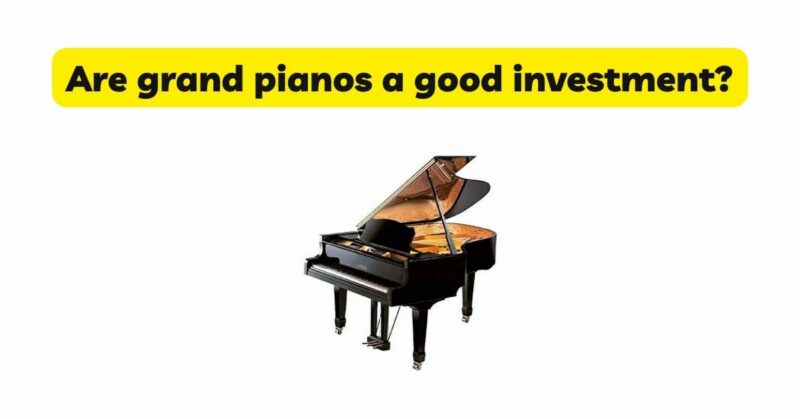Grand pianos are not only beautiful instruments but also carry a certain allure and sense of elegance. When considering the purchase of a grand piano, it is natural to wonder if it is a good investment beyond its musical value. This article aims to delve into the factors that make grand pianos a potentially valuable investment. We will explore the intrinsic qualities of grand pianos, their appreciation potential, the benefits they offer to musicians and their surroundings, and the emotional and cultural value they bring to a home or institution. By understanding the broader value of grand pianos, individuals can make an informed decision about their investment potential.
- Intrinsic Qualities and Craftsmanship:
Grand pianos are renowned for their superior sound quality, tonal range, and dynamic responsiveness. They are crafted with meticulous attention to detail by skilled artisans, incorporating high-quality materials such as premium woods, soundboards, and strings. The craftsmanship and precision involved in the construction of grand pianos result in instruments that produce rich, resonant tones and offer a remarkable playing experience. The intrinsic qualities and exceptional craftsmanship of grand pianos contribute to their value as a long-term investment.
- Appreciation in Value:
High-quality grand pianos, particularly those from reputable brands, have the potential to appreciate in value over time. Vintage and well-maintained grand pianos, especially those with unique characteristics or historical significance, can become more valuable due to their rarity and desirability in the market. The appreciation in value is driven by factors such as the instrument’s brand reputation, craftsmanship, condition, and provenance. While not all grand pianos will appreciate significantly, there is a potential for certain models to gain value, making them a worthwhile investment.
- Emotional and Cultural Value:
Grand pianos hold emotional and cultural value beyond their monetary worth. They are often considered a centerpiece of a home or institution, symbolizing sophistication, elegance, and artistic appreciation. Grand pianos evoke a sense of nostalgia and create an atmosphere of musical inspiration. They serve as a focal point for creativity, family gatherings, and cultural events. The emotional and cultural value associated with grand pianos adds to their significance as an investment, enriching the environment in which they reside.
- Musical and Artistic Expression:
Grand pianos offer unparalleled opportunities for musical and artistic expression. Their size, tonal range, and touch sensitivity enable musicians to explore a vast repertoire and convey their emotions with depth and nuance. The rich, resonant sound of a grand piano enhances the musical experience, allowing musicians to fully immerse themselves in the music they create. The ability to express oneself artistically and engage in a lifelong journey of musical exploration is a valuable aspect of owning a grand piano.
- Prestige and Status:
Owning a grand piano adds a level of prestige and status to a home or institution. It demonstrates a commitment to the arts and an appreciation for fine craftsmanship. Grand pianos are often associated with elegance, refinement, and cultural sophistication. The presence of a grand piano in a space creates a statement of taste and a sense of admiration from visitors and guests. The prestige and status associated with grand pianos can enhance the overall value of an investment.
- Longevity and Durability:
Grand pianos are built to last for generations. With proper care and maintenance, a well-crafted grand piano can provide a lifetime of musical enjoyment. Unlike other consumer goods that may depreciate quickly, grand pianos retain their value over time due to their enduring quality and craftsmanship. They can be cherished heirlooms, passed down through generations, continuing to provide joy and artistic fulfillment. The longevity and durability of grand pianos contribute to their value as an investment.
- Cultural and Educational Contributions:
Grand pianos play a significant role in cultural preservation and education. They are associated with classical music traditions and have been integral to countless compositions throughout history. Owning a grand piano supports the preservation of cultural heritage and fosters an appreciation for the arts. In educational settings, grand pianos serve as vital tools for music education, supporting students’ learning, performance, and artistic development. The cultural and educational contributions of grand pianos further enhance their value beyond the monetary aspect.
Conclusion:
Grand pianos offer a unique combination of intrinsic qualities, emotional and cultural value, potential appreciation in value, and contributions to musical and artistic expression. While the financial aspect should be considered, the investment value of a grand piano extends far beyond mere monetary return. They bring joy, inspiration, and a sense of cultural refinement to the owner’s life and the environment in which they reside. By recognizing the broader value of grand pianos, individuals can make an informed decision about their investment, considering the enriching experiences and lasting legacy that these remarkable instruments offer.


